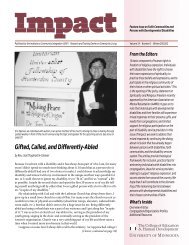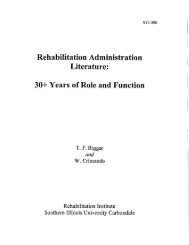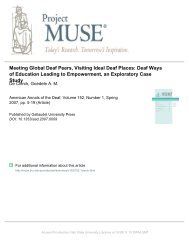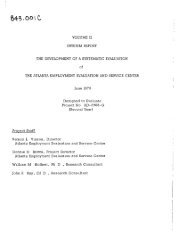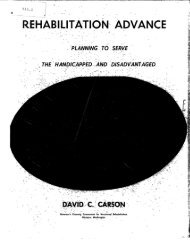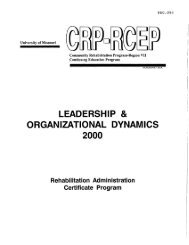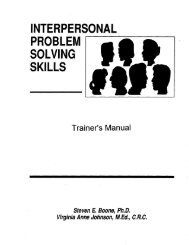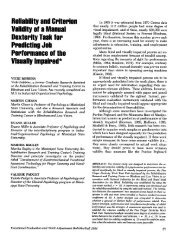by requirements for the degree of (Education) - NCRTM
by requirements for the degree of (Education) - NCRTM
by requirements for the degree of (Education) - NCRTM
You also want an ePaper? Increase the reach of your titles
YUMPU automatically turns print PDFs into web optimized ePapers that Google loves.
Factors o<strong>the</strong>r than job skills were studied <strong>by</strong> Cohen (1960) to deter-<br />
mine <strong>the</strong> reasons <strong>for</strong> failure <strong>of</strong> 57 mental retardates in 73 placements in<br />
<strong>the</strong> community after a period <strong>of</strong> institutional training at Johnston Training<br />
and Research Center, Jersey. With only a few exceptions <strong>the</strong> students were<br />
able to meet <strong>the</strong> skill and strength demands <strong>of</strong> <strong>the</strong> job; however, one third<br />
<strong>of</strong> <strong>the</strong> cases had difficulty in adjustment to <strong>the</strong> community ra<strong>the</strong>r than <strong>the</strong><br />
job and one third conveyed poor attitude with regard' to <strong>the</strong> job.<br />
In 1952, Bruno conducted a follow-up study <strong>of</strong> 18-20 year old male and<br />
female MR's to assess <strong>the</strong>ir employment record within a two year period.<br />
In<strong>for</strong>mal interviews were made to determine <strong>the</strong> reasons <strong>for</strong> job failures.<br />
It was found that <strong>the</strong> .boys and girls who were employed in jobs commensurate<br />
with <strong>the</strong>ir ability remained on <strong>the</strong> job longer. The study showed that most<br />
MR's were separated from <strong>the</strong>ir jobs because <strong>of</strong> poor attendance, poor punc-<br />
tuality, failure to adjust to work conditions, failure to get along with<br />
fellow workers, inaccuracy <strong>of</strong> per<strong>for</strong>mance and lack <strong>of</strong> continued ef<strong>for</strong>t<br />
or stamina on <strong>the</strong> job.<br />
Various research studies concluded that satisfactory social and econ-<br />
omic adjustment can be attributed to one or more <strong>of</strong> <strong>the</strong> following: i) emo-<br />
tional stability and/or general attitude (Whitcomb, 1945; Dubrow, 1960;<br />
Dinger 1961; Cohen, 1963; Shafter, 1957), 2) interpersonal relations<br />
Delp, 1967; Peckham, 1951; Windle, Stewart and Brown, 1961; Warren, 1955;<br />
Magaw and Sullivan, 1945), and 3) influence <strong>of</strong> significant persons--parti-<br />
cularly <strong>the</strong> family (Caller, Charles and Miller, 1967; Neff, 19S9; Peckham,<br />
1951; Warren, 19S5).<br />
There is some inconsistency <strong>of</strong> findi.ngs on <strong>the</strong> .relationship <strong>of</strong> Iq to<br />
vocational success. A number <strong>of</strong>studies find little or no correlation be<br />
tween <strong>the</strong> two (Bower and Switzer, 1962; Hartzler, 1951; Shafter, 1957;<br />
31



